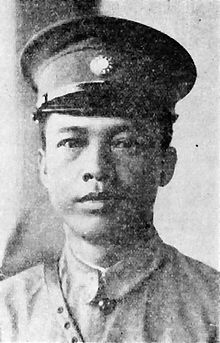Chen Jitang
| Chen Jitang 陳濟棠 |
|
|---|---|

Chen Jitang
|
|
| Born | January 23, 1890 Fangcheng, Guangxi |
| Died |
November 3, 1954 (aged 64) Taiwan |
| Allegiance |
|
| Rank | General (four stars) |
Chen Jitang (traditional Chinese: 陳濟棠; simplified Chinese: 陈济棠; pinyin: Chén Jìtáng) (January 23, 1890 – November 3, 1954), also spelled Chen Chi-tang, was born into a Hakka Chinese family in Fangcheng, Guangxi. He joined the Chinese Revolutionary Alliance in 1908 and began serving in the Guangdong Army in 1920, rising from battalion to brigade commander. He was designated commander of the 11th Division within the 4th Army in 1925 and took up the garrison of Qinzhou City in Guangxi, in 1926, thus staying in the south during the Northern Expedition. In 1928 he was made Commander of the 4th Route Army.
In addition to his military position, Chen also held governing authority over the Guangdong province. From 1929 to 1936, he made tremendous contributions to the province’s development, growth, and modernization. He paved the city streets and built high-rise commercial centers, numerous factories, and the first modern bridge across the Pearl River. He oversaw the establishment of a public school system with modern elementary and high schools and prestigious colleges and universities (including the Sun Yat-Sen University). People of the province fondly referred this period as the Golden Age of Guangdong and called him 南天王 (the Celestial King of the South).
Becoming chairman of the government of Guangdong in 1931, he turned against Chiang Kai-shek in the south after the arrest and release of Hu Hanmin and allied with New Guangxi Clique army commanders; another civil war might have broken out as a result if there had been no September 18 Incident in Shenyang, which reminded all sides of the necessity to unite. From 1931 to 1936 he was Commander in Chief 1st Army Group.
During Chiang Kai-shek's fifth campaign against Jiangxi Soviet, Chiang named Chen Jitang as the commander-in-chief of southern front, commanding over 300,000 troops, or 30% of the one million total nationalist force mobilized against the communist base. Chen's job was to blockade the southern border of the communist base and prevent the communists from escaping from the south. However, ever suspicious that Chiang's true intent was to take over his territory, as Chiang did to the local warlords in Fujian earlier, Chen only participated in the campaign half-heartedly. Although 300,000 of his troops were mobilized on paper, Chen only deployed 180,000, and their deployment was not complete until well after the Chinese Red Army had already passed Chen's territory. Furthermore, Chen made a secret deal with the communists that would ensure the Chinese Red Army would pass his territory as fast as possible, while Chen's force would not stop them in the process. This arrangement would ensure the communists would be out of Chen's territory rapidly, and that Chen's force would occupy the region the communists had passed thus eliminating any excuse for Chiang Kai-shek to send his force into Chen's territory for potential takeover. The deal was carried out successfully and neither Chen nor the communists lost anything.
...
Wikipedia
